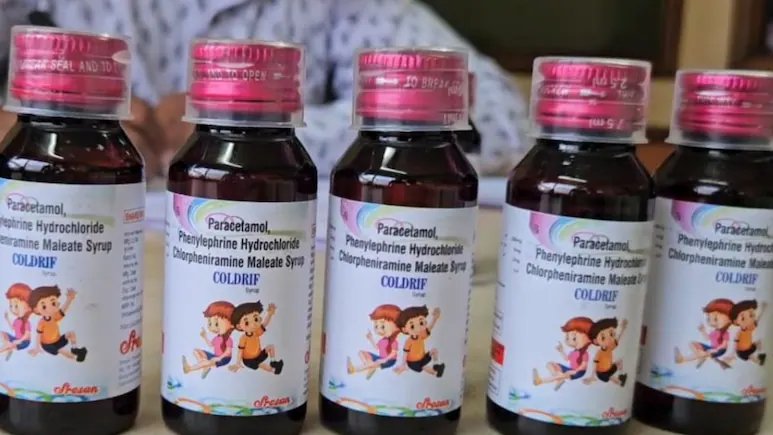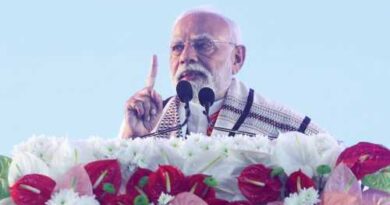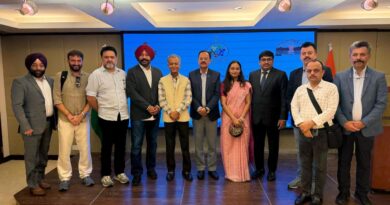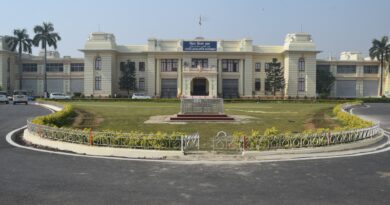Cough Syrup Crisis Deepens: Kerala Joins Tamil Nadu and MP in Banning Coldrif After 11 Child Deaths; Rajasthan Sees Third Fatality, Halts All Kaysons Pharma Drugs
Toxic DEG Found in Syrups Sparks Nationwide Probe; Rajasthan Minister Denies Link Despite Outrage, Central Team Inspects Factories as Gujarat Launches Preemptive Checks
New Delhi, October 4, 2025 – A mounting public health scandal has gripped India as Kerala became the third state on Saturday to ban the Coldrif cough syrup, following swift actions by Tamil Nadu and Madhya Pradesh, after laboratory tests confirmed the presence of diethylene glycol (DEG)—a highly toxic industrial solvent—in the product. The contamination has been linked to at least 11 child deaths in Madhya Pradesh’s Chhindwara district, all aged 1-5, with symptoms of acute kidney failure emerging since late August.
In a parallel tragedy in Rajasthan, the death toll from a separate contaminated dextromethorphan hydrobromide cough syrup rose to three on Saturday, with a six-year-old boy from Churu succumbing at Jaipur’s JK Lone Hospital after being airlifted in critical condition. The boy, whose identity has not been disclosed, developed severe respiratory distress and organ failure hours after consuming the syrup prescribed under the state’s free medicine scheme. This comes on the heels of two prior fatalities in Sikar and Bharatpur districts, where children aged 2-5 exhibited similar symptoms including vomiting, unconsciousness, and kidney shutdown.
The Rajasthan government responded decisively, suspending State Drug Controller Rajaram Sharma for allegedly granting undue leniency to manufacturers by altering quality standards—such as deeming drugs “non-counterfeit” if only one active ingredient was deficient—and imposing an immediate ban on all 19 medicines produced by Jaipur-based Kaysons Pharma, the supplier of the implicated dextromethorphan syrup. Over 10,000 samples from the firm have been tested since 2012, with 42 failing quality checks, prompting a full supply freeze and an expert committee probe ordered by Chief Minister Bhajan Lal Sharma.
Amid growing fury, Rajasthan Health Minister Gajendra Singh Khinvsar held a press conference in Jodhpur, insisting the deaths were unrelated to the syrups. “We’ve tested twice—no contamination found. These are isolated cases,” he claimed, even as a 60-year-old woman in Bharatpur, Ramdei, remains critically ill at RBM Hospital after consuming a batch from a satellite clinic on October 3, reporting acute breathing difficulties. Her family alleges the syrup, obtained via the Mukhyamantri Nishulk Dawa Yojana, triggered her collapse. Khinvsar’s remarks drew sharp criticism from opposition leaders, including former Health Minister Parsadi Lal Meena, who accused officials of “tampering with the Drugs and Cosmetics Act to shield pharma giants.”
In Madhya Pradesh, the crisis unfolded rapidly: The first suspected case surfaced on August 24, with the inaugural death on September 7. By mid-September, six more children perished from renal failure, followed by four additional fatalities, including 1.5-year-old Yogita from Barkui village, who died during treatment in Nagpur. All victims had consumed Coldrif, supplied by Jabalpur’s Kataria Pharmaceuticals and manufactured by Sresan Pharma in Kanchipuram’s Tamil Nadu facility. Tamil Nadu’s Drug Control Department, acting on Madhya Pradesh’s urgent request, tested Batch SR-13 (manufactured May 2025, expiry April 2027) and detected 48.6% DEG—far exceeding safe limits—declaring it “not of standard quality” and banning sales statewide from October 1. Production halted immediately, with stocks seized across Tamil Nadu, Puducherry, and beyond.
Kerala’s Health Minister Veena George announced the ban citing “safety red flags” from neighboring states, ordering pharmacies to recall all batches. Chief Minister Mohan Yadav of Madhya Pradesh announced ₹4 lakh compensation per affected family and vowed “strictest action” against culprits, while Deputy CM Rajendra Shukla highlighted the DEG’s role in causing kidney and liver failure. “This is a criminal lapse—brake oil solvents have no place in medicines,” echoed Congress leader Kamal Nath.
The Central Drugs Standard Control Organization (CDSCO) escalated nationally, launching inspections on October 3 across 19 factories in six states producing cough syrups and antibiotics, targeting manufacturing flaws. The Union Health Ministry’s Directorate General of Health Services (DGHS) issued an urgent advisory on Friday, prohibiting cough syrups for children under two and urging caution for those under five: “Administer only under strict supervision, minimal dosage, and avoid combinations.” Dr. Sunita Sharma, DGHS officer, emphasized, “These aren’t routine remedies—overuse risks irreversible harm.”
Gujarat, preempting spread, ordered statewide testing of cough syrup stocks Saturday, while a National Centre for Disease Control (NCDC) team collected samples from Chhindwara and Rajasthan hotspots. Experts like those from Jan Swasthya Abhiyan demand an independent panel including pharmacologists and civil society, warning of eroded trust in public health schemes. As families mourn—Nitish (5) from Sikar, Gagan (3) from Bharatpur, and now the Churu boy—the nation grapples with a preventable killer in bottles meant to heal. Investigations continue, but the toll rises, underscoring lapses in pharma oversight that echo the 2022 Gambia syrup tragedy.




